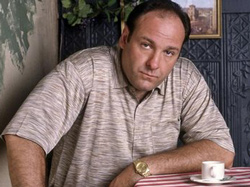 For all of the grand themes it addressed over the course of its legendary run, The Sopranos was essentially the story of a man falling apart. It’s telling, then, that series creator David Chase has said that the show could not have existed without James Gandolfini at its center as the mobster and family man Tony Soprano. The actor brought warmth and terror to the role—making Tony part little boy, part monster. But he also brought a fearlessness to the moral arc of the character. Tony Soprano, with all his macho charisma and power, was just a middle-aged man staring at the void and flinching in horror. When Gandolfini died unexpectedly in Rome on June 19th, we didn’t just lose a great character actor, we lost one of the most honest interpreters of the male ego.
For all of the grand themes it addressed over the course of its legendary run, The Sopranos was essentially the story of a man falling apart. It’s telling, then, that series creator David Chase has said that the show could not have existed without James Gandolfini at its center as the mobster and family man Tony Soprano. The actor brought warmth and terror to the role—making Tony part little boy, part monster. But he also brought a fearlessness to the moral arc of the character. Tony Soprano, with all his macho charisma and power, was just a middle-aged man staring at the void and flinching in horror. When Gandolfini died unexpectedly in Rome on June 19th, we didn’t just lose a great character actor, we lost one of the most honest interpreters of the male ego.
“Things are trending downward,” Tony Soprano says in the first episode of the series. This sense of impending doom is there at the beginning and it will be revisited time and again over six seasons (spread out over eight years). On one level (the mob level) the characters live with the fear of being murdered, and over the course of the series many important characters die violently. These sudden violent “whackings” and the tension and shock which accompany them is, of course, a major staple of the mob movie genre The Sopranos ostensibly belongs to, and they are no doubt part of the excitement of the show. Yet it is important to note how often the show concerns itself with more ordinary, if no less harrowing, forms of decline and death.
The series begins, after all, with Tony having a MRI to diagnose the cause of his fainting spells. Tony’s Uncle Junior, the most verbally entertaining character in the show, gradually declines and eventually gives way to dementia. Paulie Walnuts, at once the toughest and most insecure of Tony’s crew, is a cauldron of phobias and neuroses, chief among them a fear of germs and cancer. Johnny Sack, Tony’s adversary for much of season five and a man who knows how to smoke a cigarette, dies of lung cancer. For a non-medical show, The Sopranos spends a lot of time in hospitals—and not just for gunshot wounds.
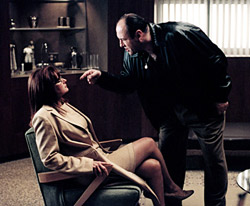 It’s important to note here that Gandolfini’s best work on The Sopranos isn’t the macho stuff—the swagger or violence or womanizing. His finest moments are when Tony is riddled with the anxiety and existential fear that drives him into Dr. Melfi’s physiatrist’s office in the show’s first episode. One suspects these moments came naturally for an actor who once described himself as “a 260 pound Woody Allen.”
It’s important to note here that Gandolfini’s best work on The Sopranos isn’t the macho stuff—the swagger or violence or womanizing. His finest moments are when Tony is riddled with the anxiety and existential fear that drives him into Dr. Melfi’s physiatrist’s office in the show’s first episode. One suspects these moments came naturally for an actor who once described himself as “a 260 pound Woody Allen.”
But the anxiety found within the show is about more than just illness. More specifically, the major undercurrent of the show’s psychology is how Tony deals with the certainty of loss. From his incessant gorging on food, his constant chasing of sexual release, the boozing, the gambling, the drug abuse, and the pathological pursuit of financial gain, to the more respectable (and perhaps healthier) outlets of family, religion, and psychiatry, Tony is always attempting to distract himself from his absolute knowledge of his own eventual decline. He knows the end is coming, but he cannot face it.
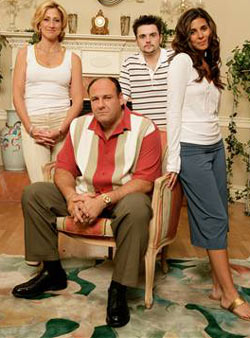 The anxiety extends even into his family, where Tony and his wife Carmela (the glorious Edie Falco) live in constant fear of the imminent collapse of their world. The most fascinating example of this tension is Tony’s relationship with his son Anthony Junior (Robert Iler). From a sweet—though self-centered—youngster into a vacuous teen, and finally into a troubled young adult, AJ is a ship without a mooring. Despite having an intact, loving (if deeply flawed) set of parents, despite having money and notoriety as the son of a famous gangster, despite having a religious (if hypocritical) upbringing, AJ has, by show’s end, become a mass of fear, rage, and depression.
The anxiety extends even into his family, where Tony and his wife Carmela (the glorious Edie Falco) live in constant fear of the imminent collapse of their world. The most fascinating example of this tension is Tony’s relationship with his son Anthony Junior (Robert Iler). From a sweet—though self-centered—youngster into a vacuous teen, and finally into a troubled young adult, AJ is a ship without a mooring. Despite having an intact, loving (if deeply flawed) set of parents, despite having money and notoriety as the son of a famous gangster, despite having a religious (if hypocritical) upbringing, AJ has, by show’s end, become a mass of fear, rage, and depression.
He is not unlike his father in these ways, of course. Yet, as even Tony points out, AJ is not able to “handle” these pressures like his father. That Tony handles his own fear and rage with violence, overeating, drugs, booze, and an endless series of extramarital dalliances is precisely the point. AJ is both better and worse off than his father. When in the depth of his son’s depression, Tony tells him “Go out. Get a blow job” and arranges for AJ to hang out with a band of racist, drunken frat boys, Tony is only prescribing a cure which, to his limited understanding of his own psychosis, has “worked” for him. Gandolfini is perfect in these scenes—loving and desperate and clueless all at once.
Chase surrounded himself with an incredible pull of talent, but there is no reason to doubt his claim that his chief collaborator was Gandolfini. The actor had come to prominence in the 90s playing hulking figures in films like True Romance (1993) and Crimson Tide (1995).
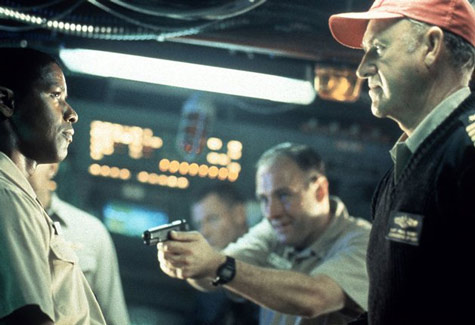 (I first noticed him in the latter film, where he strikingly played a seething asshole of a man. In his big showdown with Denzel Washington, Gandolfini lowers his bullish head and snorts through his nose like a damn Minotaur.) If he once seemed like an unconventional choice for the lead in a television series, it’s now impossible to imagine the show without him.
(I first noticed him in the latter film, where he strikingly played a seething asshole of a man. In his big showdown with Denzel Washington, Gandolfini lowers his bullish head and snorts through his nose like a damn Minotaur.) If he once seemed like an unconventional choice for the lead in a television series, it’s now impossible to imagine the show without him.
After The Sopranos, Gandolfini quickly moved on. Tony Soprano was, for the great actor, simply a role. He could have played mob bosses forever (surely someone at Marvel approached him at some point about playing The Kingpin), but his heart was in other characters like the loving father in Chase’s Not Fade Away (2012) or the peace-seeking general in the British comedy In The Loop (2009). 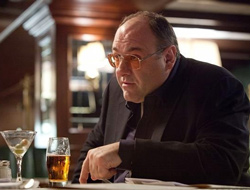 Most recently, he issued a striking turn in Killing Them Softly (2012) as another disintegrating man of violence, a past-his-prime hit man named Mickey who seems to have lost the heart for his job. Instead, he sits around bars and hotel rooms berating waiters and hookers—people who are paid to take his abuse. The performance is electrifying in its rawness. Gandolfini makes no attempt to turn Mickey into a nice guy. He’s a horrible human being (a failure of a human being, actually) reaching the end of the line.
Most recently, he issued a striking turn in Killing Them Softly (2012) as another disintegrating man of violence, a past-his-prime hit man named Mickey who seems to have lost the heart for his job. Instead, he sits around bars and hotel rooms berating waiters and hookers—people who are paid to take his abuse. The performance is electrifying in its rawness. Gandolfini makes no attempt to turn Mickey into a nice guy. He’s a horrible human being (a failure of a human being, actually) reaching the end of the line.
As the tributes continue to flood in from people who knew and worked with Gandolfini, the scope of his accomplishment seems even more impressive. Here was a man who was seemingly universally loved by his coworkers, yet who also created terrifying visions of moral collapse. What an artist.
Jake Hinkson, the Night Editor, is the author of The Posthumous Man.
Read all posts by Jake Hinkson for Criminal Element.

Insightful piece, Jake. You make some great points about how Gandolfini and through him the show got at so many things beyond just the gangster story aspects. Along similiar lines perhaps: there were times watching during various seasons where I’d think that as great a show as it is for the gangster genre parts, it’s truly brilliant as a study in the mundanity of contemporary life and as a look at suburban ennui and emptiness (and I grew up in suburbs not so different than where Tony and company live so a lot of it struck a chord). The cast as a whole was great but Tony, especially, got at those aspects for me, sitting there in his basement watching nature shows, freaking out because the wild ducks left his pool, often going into his kitchen for a snack because he has nothing else to do, and on and on. A remarkably rich character he brought to life.
Excellent point, Scott. The show was as much about suburban angst as American Beauty, except that The Sopranos strikes deeper and truer.